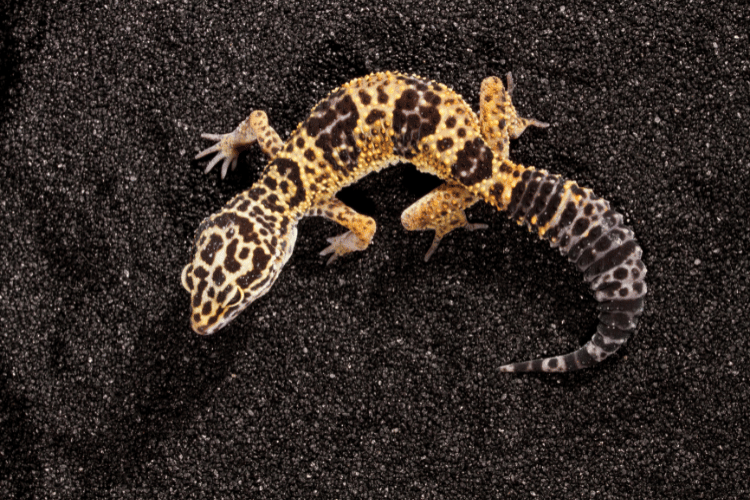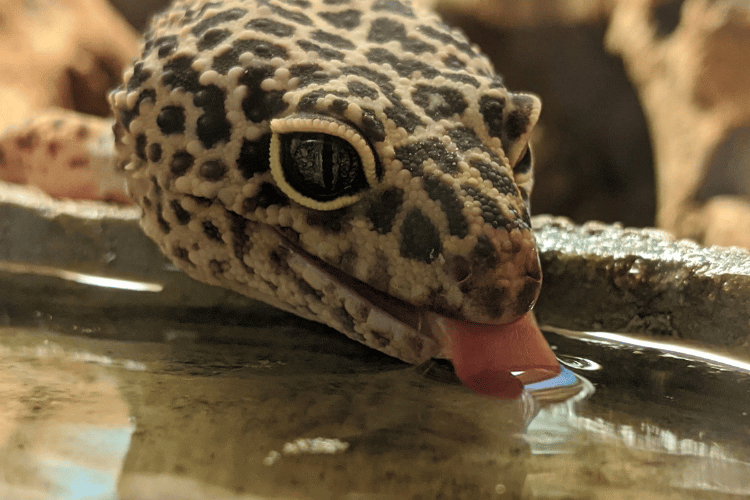Leopard geckos are fascinating reptiles known for their unique characteristics. Among the various aspects of their health, bowel movements play a crucial role in gauging their well-being. If bowel movements are impaired, you might notice that your Leopard gecko’s poop is stuck.
Stuck poop or impaction can happen because of dehydration, feeding habits, temperature, and various other factors. Understanding the significance of addressing fecal impaction in these creatures is vital for their overall health and longevity.
This article aims to delve into the health of leopard geckos, particularly focusing on the importance of regular bowel movements, the distress caused by fecal impaction, and the essential steps to prevent and treat this concern effectively.
Understanding Impaction in Leopard Geckos
Understanding the concept of impaction in leopard geckos is pivotal for their owners. It refers to the blockage within the digestive tract that hampers the gecko’s ability to excrete waste properly.
What Is Impaction?
Impaction, in simpler terms, manifests as a blockage in the gastrointestinal tract, hindering the natural passing of fecal matter. This condition can pose severe health risks and discomfort to the gecko.
Here are some of the most common causes of stuck poop in geckos:
Diet
- Large or hard-to-digest feeders: Feeding your gecko insects that are too large for their size or have hard exoskeletons can cause digestive problems. Avoid superworms, adult Dubia roaches, or beetles for smaller geckos.
- Overfeeding: Overfeeding, especially with fatty feeders like waxworms, can overwhelm the digestive system. Stick to a feeding schedule based on your gecko’s age and size.
- Low fiber content in the diet: Lack of fiber in the diet can make it difficult for the gecko to pass stool. Offer variety in feeder insects like crickets, roaches, and appropriate-sized worms.
Environment
- Loose substrate: Loose substrates, especially sand, can be accidentally ingested and block the digestive tract. Use paper towels, reptile carpets, or a substrate mix with larger particles like coconut fiber.
- Low temperatures: Cool temperatures slow down digestion, making impaction more likely. Ensure proper temperature gradients in your gecko’s enclosure with warm basking areas and cooler hides.
- Dehydration: Dehydration can harden stool and make it difficult to pass. Provide fresh water in a shallow dish and mist the enclosure regularly, especially during shedding periods.
Other factors
- Parasites: Internal parasites can interfere with digestion and contribute to impaction. Regular fecal exams and parasite prevention are crucial.
- Anatomical abnormalities: Some geckos may have congenital malformations or injuries that affect their digestive system.
Signs and Symptoms of Impaction
Impaction, or stuck poop, is a serious and potentially fatal condition for geckos. Early detection and intervention are crucial for their well-being. Here’s a quick look at the signs and symptoms to watch out for:
Common Signs
- Constipation: This is the most common indicator. Monitor your gecko’s pooping habits. If they haven’t passed stool for several days, it’s a cause for concern.
- Straining: Observe your gecko during bowel movements. If they seem to be pushing hard but nothing comes out, they might be straining to pass impacted stool.
- Lethargy and decreased activity: A normally active gecko becoming sluggish and withdrawn can be a sign of impaction or other health issues.
- Loss of appetite: Geckos with impaction often lose their interest in food, especially if their digestive system is blocked.
Behavioral Changes

- Licking their cloaca: Geckos might lick their cloaca (the vent area) more frequently if they’re having trouble defecating.
- Hiding more than usual: Geckos may hide away more often if they’re feeling unwell due to impaction.
Physical Symptoms
- Bloated abdomen: A noticeably swollen belly, especially firm to the touch, can indicate impaction.
- Weight loss: As geckos stop eating due to impaction, they may start losing weight.
- Dehydration: Dry, sunken eyes and wrinkled skin can be signs of dehydration, which can worsen impaction.
Impaction Treatments and Remedies
The impaction might be fixable at home or it may require a visit to the vet.
Home Remedies for Mild Impaction
If the impaction isn’t too severe, or if you’ve discovered it early, you can try the following:
- Warm Water Baths: Fill a shallow container with lukewarm water and gently submerge your gecko for 10-15 minutes. Encourage swimming and massage their abdomen. Repeat 2-3 times a day for mild cases.
- Olive Oil: Use a dropper to apply a single drop onto your gecko’s lips. Avoid forcing it or getting near their nostrils.
Important Note: Use these only for mild impaction and consult a vet if symptoms worsen within 24 hours.
Veterinary Intervention for Severe Cases
If the condition worsens, or if you discover that your Leo has been suffering from impaction for more than 24 hours, you should take your pet to the vet as soon as you can.
- Vet Examination and X-rays: A vet will assess the impaction’s severity and location.
- Surgery: For severe cases or failed home remedies, surgery may be necessary to remove the impacted material.
Preventive Measures for Avoiding Impaction
By following these five preventive measures, you can ensure that your gecko never suffers from stuck poop again.
Choosing the Suitable Substrate
One of the most important preventive measures for leopard geckos is choosing suitable loose substrates that do not cause impaction, such as paper towels, tile, or reptile carpeting. Loose substrates like sand should be avoided.
Appropriate Feeding
It’s also vital to feed an appropriate diet with properly-sized feeder insects. Feeders that are too large can cause impactions. Crickets should be no bigger than the space between the gecko’s eyes. Providing a balanced mix of feeders like mealworms and waxworms along with gut-loaded crickets is ideal.
Appropriate Water Intake

Dehydration increases impaction risk. Provide a shallow water dish that’s cleaned and refilled regularly. Having an under-tank heating pad under one side of the tank helps create a temperature gradient and humid hide.
Maintaining Proper Temperature
Maintaining optimal enclosure conditions can also help avoid impaction. Keep the tank warm with a hot spot around 90-95°F and a cool side around 75-80°F. Make sure humidity stays around 40-60%.
Maintaining a Clean Home
Doing weekly spot cleaning and deep cleaning monthly keeps the overall habitat clean and healthy. Following these preventive measures can greatly reduce the chances of poop stuck or impactions in pet leopard geckos.
Final Words
So, that’s the lowdown on Leopard Gecko poop issues! It’s clear that keeping an eye on your Gecko’s bathroom habits is a big deal. We covered what causes poop problems, how to spot them early, and the tricks to treat and prevent them.
By watching their diet, keeping things cozy, and giving a little TLC, you can make sure your Gecko’s gut stays happy and healthy!
- Can Leopard Geckos Eat Silkworms? - March 11, 2024
- Do Leopard Geckos Climb? - March 4, 2024
- Do Leopard Geckos Bask? The Answer Will Surprise You - February 21, 2024
